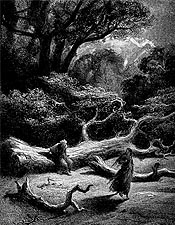The Wanderer
, translated by Kline, A. S. (contact-email)
The Wanderer is a poem from the Exeter Book, comprising 115 lines of alliterative verse. The author and date of composition are unspecified, but the piece is thought to predate the late 9th or early 10th century. Characterised by an alliterative metre with a mid-line caesura, the poem is recognised as an Anglo-Saxon elegy. It narrates the reflections of an exile, known as eardstapa—translated as wanderer (from ‘eard’ meaning earth or land, and ‘steppan’, meaning to step). The speaker reminisces about his past life of companionship and contrasts its warmth with his present solitary wandering along the paths of exile (wræclastas). The wanderer reflects on his hardships yet transcends his personal sorrow through contemplation of the divine. The poem exhibits elements of Old English wisdom literature, depicting the inevitable decay of worldly grandeur in contrast to the concept of salvation through faith in God. There is scholarly debate over the poem’s concluding religious admonition, which some argue could be a subsequent insertion, though opinions differ.

Kline, A. S.
Support Open-Access:
Your contribution keeps our classical translations available to all. Every dollar helps support classics education and funds the expansion of our catalogue. Value what we do? Donate now.
File Downloads:
© Copyright, All Rights Reserved. This work may be freely reproduced, stored and transmitted, electronically or otherwise, for any non-commercial purpose. Conditions and Exceptions apply.